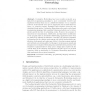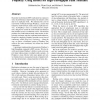219 search results - page 38 / 44 » Byzantine Quorum Systems |
PADL
2009
Springer
14 years 10 months ago
2009
Springer
Declarative Networking has been recently promoted as a high-level programming paradigm to more conveniently describe and implement systems that run in a distributed fashion over a ...
PDCAT
2009
Springer
14 years 4 months ago
2009
Springer
Abstract—Awerbuch and Scheideler have shown that peerto-peer overlays networks can survive Byzantine attacks only if malicious nodes are not able to predict what will be the topo...
DSN
2005
IEEE
14 years 3 months ago
2005
IEEE
Designing a distributed fault tolerance algorithm requires careful analysis of both fault models and diagnosis strategies. A system will fail if there are too many active faults, ...
NSDI
2010
13 years 11 months ago
2010
Byzantine fault-tolerant (BFT) replication has enjoyed a series of performance improvements, but remains costly due to its replicated work. We eliminate this cost for read-mostly ...
INFORMATICALT
2006
13 years 9 months ago
2006
Generally, the task in a distributed system must achieve an agreement. It requires a set of processors to agree on a common value even if some components are corrupted. There are s...



